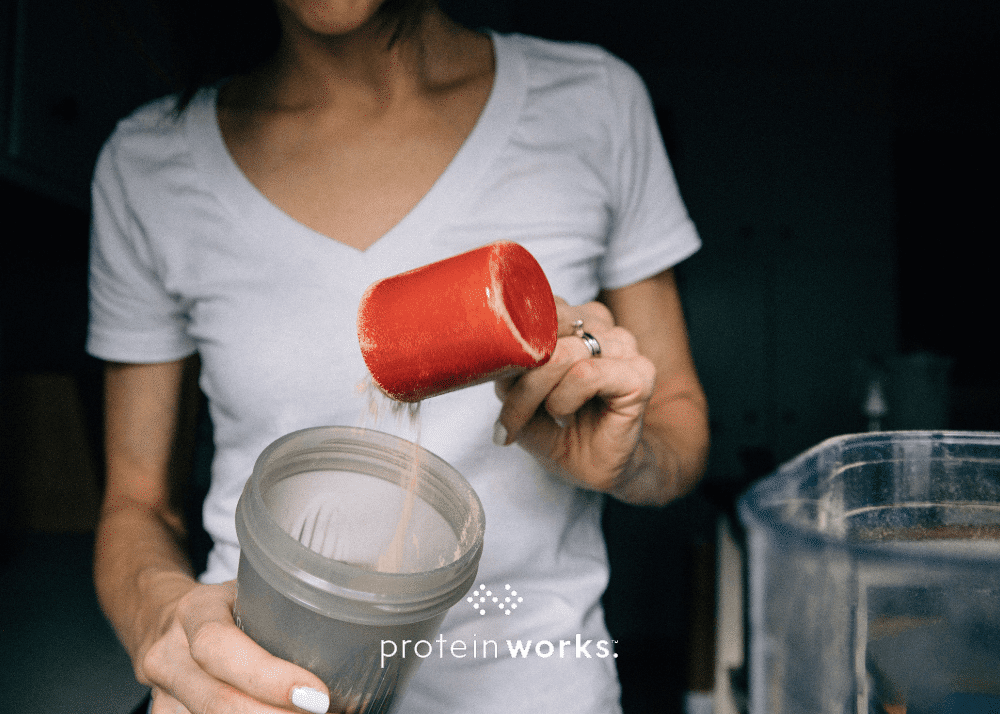
Protein Shake With Milk or Water?
Should you have a protein shake with milk or water? The answer depends on what you want to achieve. Do you want to build muscle mass or reduce your calorie intake?
If you’re aiming to get bigger and stronger, mixing protein with milk works better as it gives you more calories and extra protein. But if you’re aiming to lean out, stick to water. It’s all about what you’re trying to achieve with your nutrition and why you’re having protein shakes.
Most protein shake labels advise you to take your powder with either milk or water, but what’s the difference?
Find out below…
Benefits of a Protein Shake With Water
Adding water to your shake is the easier, cheaper and more convenient option over milk, however, it really does depend on personal preference and ultimately your goal to which one you should go for.
Convenient
Unlike milk, water is readily available everywhere. You can bring a shaker filled with powder to the gym and add water whenever you want. This keeps your drink fresh and prevents spills in your gym bag. This is especially handy if you have to carry your shake with you all day, like when you’re doing an evening workout after work or on the go with the kids in hand. An added bonus is that you can also use tap water for free!
Quick Absorption
Compared to milk, water can be absorbed instantly when consumed. In fact, studies have shown that within five minutes water has already been absorbed into the bloodstream, meaning that the protein can be taken directly to where it is needed much quicker than milk.
Fewer Calories
Water is essentially empty in terms of calories, carbohydrates, fats, and sugars. When you mix it into your shake, you’re not adding any extras – what you see in the pouch is what you’ll have in your drink. This is particularly beneficial if you’re watching your calories, as it ensures you’re aware of precisely what you’re consuming.
Hydration
We often hear the advice to increase our water intake and stay hydrated, particularly if we’re physically active. Water is essential for every part of your body – from cells and organs to tissues – as it plays a key role in regulating temperature and various bodily functions. It safeguards your tissues, assists in waste removal, and supports digestion. When you mix water with your shake, you’re also receiving these valuable benefits. Ultimately, water is indispensable; it’s one of the most vital substances on Earth and has a profound impact on our existence.
Benefits of a Protein Shake With Milk
If you’re on the journey for muscle gaining then milk would be the choice over water because you’re adding extra nutrients into your shake and boosting its protein contents. The additional protein contents and amino acid make-up of milk can also help to stimulate protein synthesis more effectively than water too.
More Calories
A 200ml serving of semi-skimmed milk contains around 100 calories, so even though you’re getting additional protein, you’re also getting extra calories. With two shakes a day, this could mean an extra 200 calories daily. These surplus calories are beneficial for individuals aiming to gain muscle mass.
Tastier
This aspect can vary based on personal preference. A lot of individuals enjoy the flavour of whey protein shakes mixed with milk rather than water, as milk contributes a silky texture that results in a more indulgent and creamy taste. Essentially, it’s like drinking a milkshake. Powders also easily mix into milk, so there won’t be any hard lumps if you use quality protein too.
More Calcium
When you mix milk into your shake, you’re also giving your body an extra dose of calcium. Usually, a 200ml milk serving holds slightly more than 250mg of calcium. The recommended daily calcium intake is 700mg, so adding milk to your protein shake provides about 28% of your daily calcium needs. Calcium is renowned for strengthening bones, but it’s also crucial for blood clotting, energy metabolism, muscle operation, and cell division – making it a valuable addition.
Hydration (Again)
Surprisingly, milk has been discovered to be more hydrating than water. Research shows that milk has a higher hydration index, aiding in the replenishment of sodium lost through sweating and improving fluid retention within the body. It’s not a suggestion to replace water with milk, considering our bodies are composed of around 75% water and milk comes with extra calories. However, it’s an intriguing point worth considering.
Milk Chart (per 200ml):
Skimmed Milk: Fat: 0.6g Sugar: 10g Protein: 7.2g Carbohydrates: 10g Calories: 74
Semi-skimmed Milk: Fat: 3.6g Sugar: 9.6g Protein: 7.2g Carbohydrates: 8.6g Calories: 100
Whole Milk: Fat: 7.4g Sugar: 9.4g Protein: 7g Carbohydrates: 9.4g Calories: 122
What about Plant Based Milk?
If you love the smooth silky texture and taste milk gives to your protein shake but don’t want too many extra calories added or are a vegan then plant-based milk is the way forward.
For example, 200ml of almond milk contains 44 calories, 2.2g of fat, 4.8g of sugar and 0.8g of protein, while also containing 240mg of calcium. Starting to make a little more sense now.
You could also try hazelnut milk too which contains 58 calories, 3.2g of fat, 6.2g of sugar and 0.8g of protein too. They’re both also incredibly similar to the texture and smoothness of cow’s milk, you probably won’t even be able to tell the difference.
Protein Shake with Milk or Water? A Quick Summary:
- Adding just 200ml of semi-skimmed milk can add an additional 7.2g of protein to your shake
- Milk has a better hydration index than water
- Water does not add any additional nutritional content to your shake but does not add any additional calories too. Basically what you see on the pouch is what you get in your shake, which is ideal if on a calorie controlled diet.
- Milk gives your shake a creamier taste and texture.
- 200ml of semi-skimmed milk can add an extra 100 calories to your shake, which if you’re wanting to gain mass, will be a great addition.
- Water is essential for muscle function and overall performance.
If you’re inspired by this article, read through the top 5 tips on starting the week right. Or, check out our amazing selection of Protein Shakes!








No Comments yet!